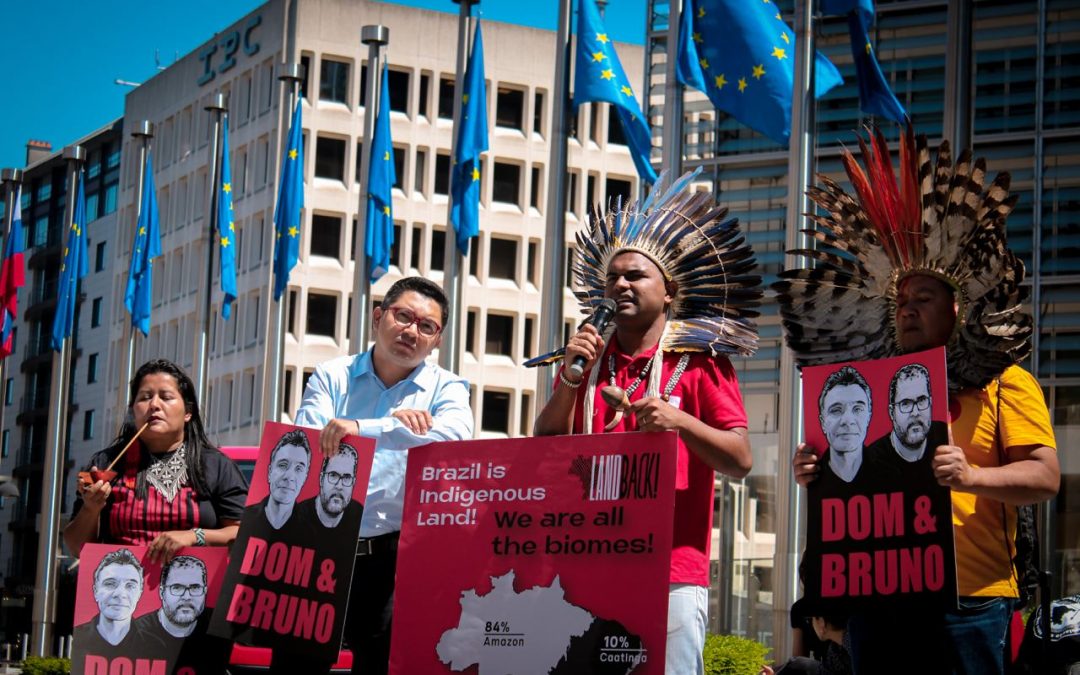
27/Jun/2022
The European Parliament’s Environmental Commission is currently debating the text of the Proposal for a regulation on deforestation-free products (FERC), also called the deforestation-free law, which will be voted on in September. The legislation contains some extremely important gaps to guarantee the rights of Indigenous Peoples and the protection of their territories.
European countries, importers of Brazilian commodities such as beef, soy and leather, need to take responsibility for the impacts that these large-scale production chains have on Indigenous Lands in Brazil. Europe is the second largest market for selling soybeans produced in Brazil, as well as a major importer of Brazilian beef and other forest-risk products. Agribusiness, mining and other large-scale exploration put strong pressure on the protection of Brazilian biomes, the guarantee of indigenous rights and climate change. European demand for commodities amplifies these conflicts. Therefore, it is necessary to impose limits and create traceability mechanisms committed to human rights and the environment. Brazil is currently experiencing a delicate moment of dismantling of policies and institutions, in addition to an increase in violence in the countryside, as the murder of indigenist Bruno Araújo and journalist Dom Phillips has shown. According to the 2021 Global Witness report, Brazil is the fourth most violent country for environmental and human rights defenders.
To focus on this debate, APIB toured Europe with a delegation of indigenous leaders between June 8th and 17th. In the first days, the delegation was in Paris, France, following the investigation of the Casino case, an international supermarket retailer accused of selling products linked to deforestation and land grabbing in Brazil and Colombia (you can read more about the case and the APIB tour in Europe here). In the second part of the trip, between the 13th and 17th of June, the entourage of indigenous leaders from APIB was in Brussels, Belgium, and held several meetings with members and committees of the European Parliament to position themselves on the law on deforestation-free (FERC) and to demand that Parliament include the demands of Indigenous Peoples in that legislation.
The ministers representing the member states of the European Union will put their positions in relation to the law at the next European Environment Council, which will take place on June 28th. Subsequently, the Environment, Public Health and Food Safety Committee – which is responsible for drafting the FERC law – will vote in mid-July on the proposed amendments to the draft presented, with the aim of having the final text for voting by the law in the plenary of Parliament in September 2022.
What is currently proposed by the Law on deforestation-free (FERC)?
The European Commission’s Proposal for a regulation on deforestation-free products (FERC) pretends to avoid the importation of products that promote illegal deforestation within their production chains. The proposed law, presented on November 17th 2021, seeks to create sanctions for products that pose a risk to the environment, but would only be implemented on lands considered forests according to the definition of the FAO (Food and Agriculture Organization of the United Nations). This definition disregards a large part of the Brazilian biomes and, as a consequence, also excludes the reality of a good part of the Indigenous Peoples of Brazil.
If the FAO definition of forests is the only criterion taken into account, Brazilian biomes would be at risk due to large-scale commodity production chains: 75% of the Cerrado, 89% of the Caatinga, 76% of the Pantanal and 74% of the Pampa, according to data from MapBiomas.
The proposed law would be applied in only 15% of the Pantanal region, one of the biomes most affected by fires in recent years, and completely disregards the Pampas biome in the south of the country, where historical processes of invasion and occupation of indigenous lands are taking place, caused mainly by the advance of soy and livestock. The Cerrado biome, with only ¼ of its area recognized as forest within the FAO definition, is today one of the regions with a significant advance in agribusiness and livestock, in addition to the expansion of the agricultural frontier in the MATOPIBA (forest region between Maranhão, Tocantins, Piauí and Bahia States), which already brings impacts to the contamination of soils and water due to the excessive use of pesticides. The Atlantic Forest (Mata Atlántica) and Caatinga would also not be fully recognized as a forest despite being intensely consumed and threatened by industrial activities and agribusiness, respectively. The Amazon would be the only biome with the greatest extent recognized as a forest within the considerations of anti-deforestation legislation. However, about 15% of the biome would be unprotected by this law, as in the case of Lavrado (vegetation present in parts of the state of Roraima, in addition to other patches of Cerrado present in the Amazon).
Another loophole in the FERC proposal is that it only requires each country to be responsible for complying with its national laws. However, this implies a great risk in the current context of dismantling of public policies promoted by the current and anti-indigenous Brazilian government that could continue marketing certain products without violating any national law. The proposed law also does not talk about the exclusive right of possession and usufruct of Indigenous Peoples over their lands or the obligation to comply with international laws such as article 169 of the ILO (International Labour Organization).
And the third and final weakness of the legislation pointed out by APIB is what it says in relation to the products that could be traced and the commercialization deadline. The draft text proposes that six commodities, coffee, cocoa, cattle, palm oil, soy, wood, and derived products, will have to go through due diligence before being placed in the EU market. Importers and traders will have to ascertain that the commodities were not produced or grown in a land that suffered deforestation or degradation after December 31st, 2020 and are in accordance with the producing country’s laws. The law excludes the traceability of canned meat, corn and cotton, among other products at forest risk. At the same time, the time frame for commercialization allows, for example, that frozen meat, as well as stored cereals (such as soy) that were produced on deforested pasture in 2019 can be commercialized.
What are APIB’s demands in relation to deforestation-free legislation (FERC)?
APIB appeals to the European Parliament to recognize the reality of the multidimensional impacts and responsibility of European economic and commercial dynamics on indigenous lands in Brazil. To that end, it specifically requests:
- Effective mechanisms for tracking commodity production chains are needed because productive, economic and financial pressures have a major environmental impact and an increase in violence against Indigenous Peoples, especially against their leaders.
- All of Brazil’s biomes need to be included in the European deforestation-free law, as a concrete response to the climate emergency and the cases of violence that have multiplied in our territories, with the encouragement of the Brazilian government. APIB wants the FAO definition of forests not to be used, and thus allow that, in addition to the Amazon, this legislation also includes the protection of the Cerrado, Pantanal, Pampas, Mata Atlántica and Caatinga.
- It is necessary to consider the position of Indigenous Peoples: to go beyond the goals established in international agreements, to consider the vital role that indigenous communities play in climate responsibilities as guardians of the forest and to take into account the opinion of those who directly suffer the impacts of the predatory production chains of commodities in Brazil.
“For us Indigenous Peoples, no biome is different, they are all part of the Brazilian territory, which is an indigenous territory. And we, the indigenous people, live in all these biomes. So it is important that European anti-deforestation legislation considers all of them”, declares Kretã Kaingang, executive coordinator of APIB. “What hurts with soy, what hurts with murders, what hurts with the invasion of territories, what paralyzes the demarcation of indigenous lands happens in all biomes. With the inclusion of all biomes in this legislation, we have more strength to defend these biomes. We already do this without law, but we know that European countries buy products from all these biomes, not just from the Amazon, and their protection influences our daily lives”, adds Kaingang.
More details in the document prepared by APIB: “Message to the European Parliament on the urgency of passing the European Deforestation-Free Law (FERC)”.
How was the APIB advocacy campaign carried out in the European Parliament?
On Thursday, June 16th, the APIB delegation and Extinction Rebellion spoke out in front of the European Commission to demand that parliamentarians include the demands of Indigenous Peoples in the deforestation-free legislation (FERC). (See photos of the act here).
“Our influence in the European Parliament was very necessary for us to spoke out our situation as Indigenous Peoples of Brazil. Thanks to this dialogue with the European Parliament, it may be possible to modify the draft law. We are here with an opportunity to intervene internationally as indigenous organizations, as it is difficult to be heard in the current context of Brazil with this anti-indigenous and fascist government, which only seeks profit at the expense of those who live on that land like us”, explains Crisanto Rudzö Tseremey’wá, leader of the Coordination of Indigenous Organizations of the Brazilian Amazon (COIAB).
During the delegation’s stay in Brussels, other important meetings took place, such as meetings with José Manuel Fernandes, chair of the Brazilian delegation to the European Union; Jérémy Decerle, French Member of the European Parliament ; and Anne-Margreet Sas, representative on agriculture on the UK Netherlands standing committee in the European Parliament. In the three meetings, members of parliament were interested in understanding the current situation in Brazil suffered by Indigenous Peoples, but claimed that at this moment it would not be possible to include other biomes in the anti-deforestation law. Possibly, after the law is passed by Parliament (which should take place in September 2022), the inclusion of other biomes and/or a broader definition of forests/vegetation could be included in the regulatory review, which should take place in 2024. This was the same speech used by technicians from the General Council for the Environment and the European Parliament Research Center on the inclusion of biomes. They also reiterated that Human Rights, including those of Indigenous Peoples, should be established in other due diligence legislation (still being drafted by Parliament) rather than in a deforestation-free law. These meetings frustrated the APIB delegation, seeing that the European Parliament is not that committed to mitigating its trail of destruction to guarantee a real deforestation-free supply of commodities.
On the other hand, there were moments of support, such as the meeting with members of the European Parliament’s Group of the Greens, formed by Michèle Rivasi, Grace O’Sullivan, Francisco Guerreiro, Anna Cavazzini, among others. At lunch with part of the indigenous delegation, they strengthened the support network for the construction of an ambitious deforestation-free law, which meets the demands of indigenous peoples and those who are most impacted by the production of commodities. In addition to meetings with members of the European Parliament, the APIB delegation took the opportunity to meet with its network of partners in Europe, such as FERN, Greenpeace, Global Witness, Friends of Earth to strengthen alliances and discuss strategic actions to promote guarantee the fulfillment of the rights of Indigenous Peoples.
See more photos from the APIB Tour in Europe:
How important is an international mobilization of Indigenous Peoples?
In a scenario of dismantling of public policies in Brazil and the illegal advance of industries (agribusiness, livestock, mining, energy, hotels), the productive and economic demand coming from the European Union and other countries or economic blocks feeds and accelerates the processes of invasion, expropriation and destruction of Indigenous Peoples and their lands. The right to the territory is guaranteed by the Federal Constitution of 1988, through the demarcation process, being the responsibility of the Brazilian Executive Power. However, in a scenario where the president of Brazil is the greatest enemy of Indigenous Peoples and reinforces the advance of agribusiness and the fragility of inspection institutions, it is up to Brazil’s economic and commercial partners to demand and press for the fulfillment of the indigenous rights.
In addition, APIB denounces that the murders of indigenist Bruno Araújo and journalist Dom Phillips are not isolated cases, but a consequence of systematic violence promoted by the militarist and anti-indigenous state commanded by the genocidal Jair Bolsonaro. “They found the bodies of Bruno Araújo and Dom Phillips. This is the real situation in our country and that is why we are here in Belgium, to make these complaints and to dialogue with the deputies about the laws that are being created here in Europe and that directly affect our lives in our territories”, says Eunice Kerexu, executive coordinator of APIB. “We are not here to say stop this export, but to reinforce the need to create a legislation that helps us protect our lives and our territories”, adds Kerexu.
About the Articulation of Indigenous Peoples of Brazil (APIB)
APIB is the largest instance of representation of the Brazilian indigenous movement and has, since its creation, fulfilled its commitment to fight for the guarantee of the constitutional rights of Indigenous Peoples. Whether nationally or internationally, APIB and its seven grassroots organizations are mobilized to protect territories, communities and people.
The Indigenous Peoples, articulated through their regional organizations and APIB, seek in all instances the accountability of those responsible for this destruction. Internationally, APIB, in addition to participating in climate events and debates, seeks to make the agents responsible for the dynamics of invasion, illegal exploitation and destruction of indigenous territories accountable, as well as influencing the debate on the formulation of the new Regulation on deforestation-free products (FERC). In Brazil, APIB has historically mobilized the indigenous movement and faced the anti-indigenous policies that are being processed in the Federal Supreme Court and in the Chamber of Deputies, forming the front line of protection of Indigenous Peoples and Lands, and consequently, of the environment and the environment’s future. To protect indigenous territories and ensure respect for constitutional rights, APIB resists and advances on different scales.
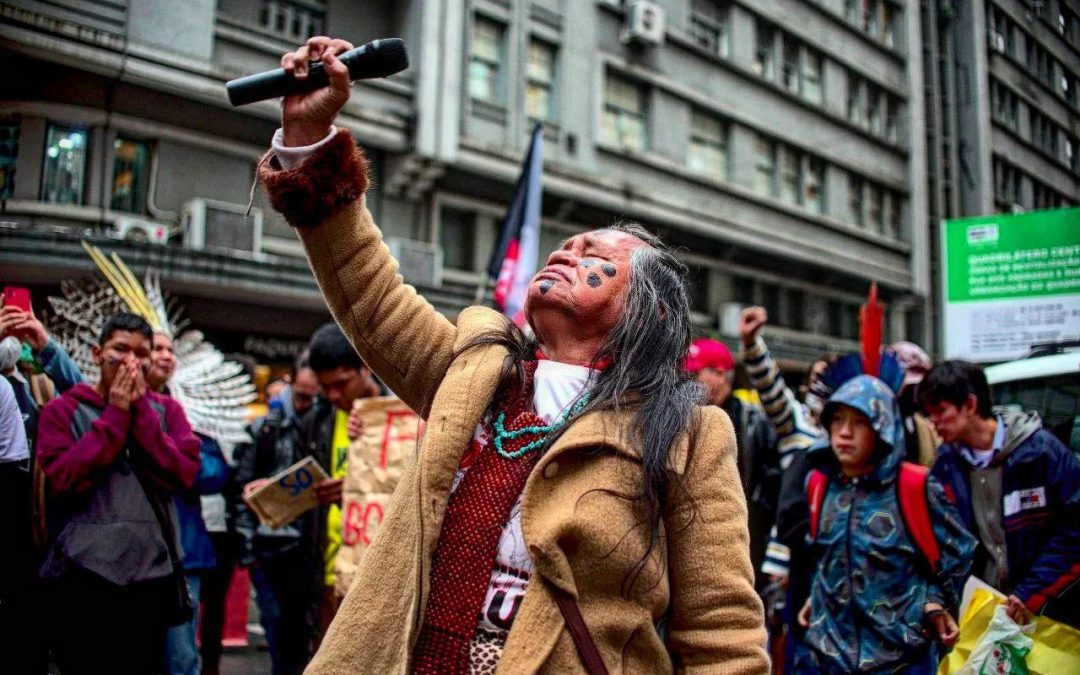
24/Jun/2022
The voices of Brazil’s indigenous peoples echoed through the deepest corners of the country and in social networks on Thursday (23). The mobilizations called by Apib (Articulation of Indigenous Peoples of Brazil) marked the day when the Federal Supreme Court (STF) was supposed to vote on the thesis of the Milestone Thesis or Xokleng Case, a decision that will affect all indigenous territories in Brazil, however, the matter was postponed for the third time. “When we are faced with an authoritarian government, we expect courage from the Supreme Court to safeguard the fundamental rights of indigenous peoples,” demanded Eloy Terena, legal representative of Apib.
Also among the demands were justice for the murders of journalist Dom Philips and indigenist Bruno Pereira, and the exoneration of the president of the National Indigenous Foundation (FUNAI), Delegate Marcelo Xavier, for conducting an anti-indigenous policy at the head of the agency. In all, there were 39 actions, in all regions of Brazil, involving dozens of territories, including political acts and closures of roads, in addition to acts in 40 FUNAI headquarters carried out by the workers on strike. For Eloy, today’s actions “demonstrate categorically how much the indigenous peoples are victims of this genocide policy implemented through an anti-indigenous FUNAI. And how the delay in judging the Milestone Thesis is causing violence against indigenous peoples to increase”.
In São Paulo, hundreds of people showed solidarity with the cause by gathering with the indigenous people in front of the Art Museum of São Paulo (Masp) in the late afternoon. In Brasília, the mobilization took place in the Três Poderes square, in front of the STF, where sacred rituals were performed. Afterwards the documentary “Luta pela Terra”, made by young indigenous people, was released. The work brings together images and feelings in one of the most important moments of the struggle of indigenous peoples against the Milestone Thesis and the judgment of the Extraordinary Appeal 1.017.365, which deals with the demarcation of indigenous lands in the country.
In Brasilia, indigenous people from the Terena, Kaingang, Tuxá, Xokleng, Tupinambá, Karapó, Guarani Nhandeva, Guarani Kaiowá, Takaywrá, Cinta Larga, Karipuna, Tukano, Macuxi, Wapichana, Taurepang, Mura and Marubo peoples participated: with parliamentarians at the National Congress; at the National Human Rights Commission (CNDH); at the National Justice Council (CNJ); at the Supreme Court; at the National Indigenous Foundation (Funai); in addition to the “Seminar on the Constitutional Regime of Indigenous Lands in Brazil,” at the University of Brasília (UnB), which brought together indigenous people, partners, academics and jurists.
Militarized Funai
Under the command of a Bolsonarist delegate, Marcelo Xavier, Funai has completely stopped the land demarcation processes. Recently, during the searches for Bruno and Dom, the role of the foundation was restricted to defaming the indigenous organizations and accusing the indigenists of entering the territory of the Vale do Javari without authorization, which was not true.
In response to this, the foundation’s employees went on strike and joined the demonstrations today. Along with the Funai workers, Dinamam Tuxá, of the Apib coordination, condemned the practices of the institution. “Today FUNAI is under the power of large corporations, people linked to the armed forces who do not have the technical and scientific knowledge to conduct any kind of process related to indigenous policy. And the reflection of this is the criminalization of the indigenous movement, the persecution of the FUNAI staff, of those who have notorious knowledge about the subject, and the violence”.
About the Milestone Thesis
The milestone thesis intends to restrict the demarcation of indigenous lands only to those areas that were under the proven possession of the original peoples on October 5, 1988, date of the promulgation of the Federal Constitution. The thesis of indigenato, on the other hand, recognizes indigenous possession of the land as original, that is, prior to the creation of the Brazilian State itself. For the indigenous movement, it is fundamental that the Milestone Thesis be denied by the STF as soon as possible, because the proposal is an incentive for traffickers, gold miners, loggers and invaders of the territories.
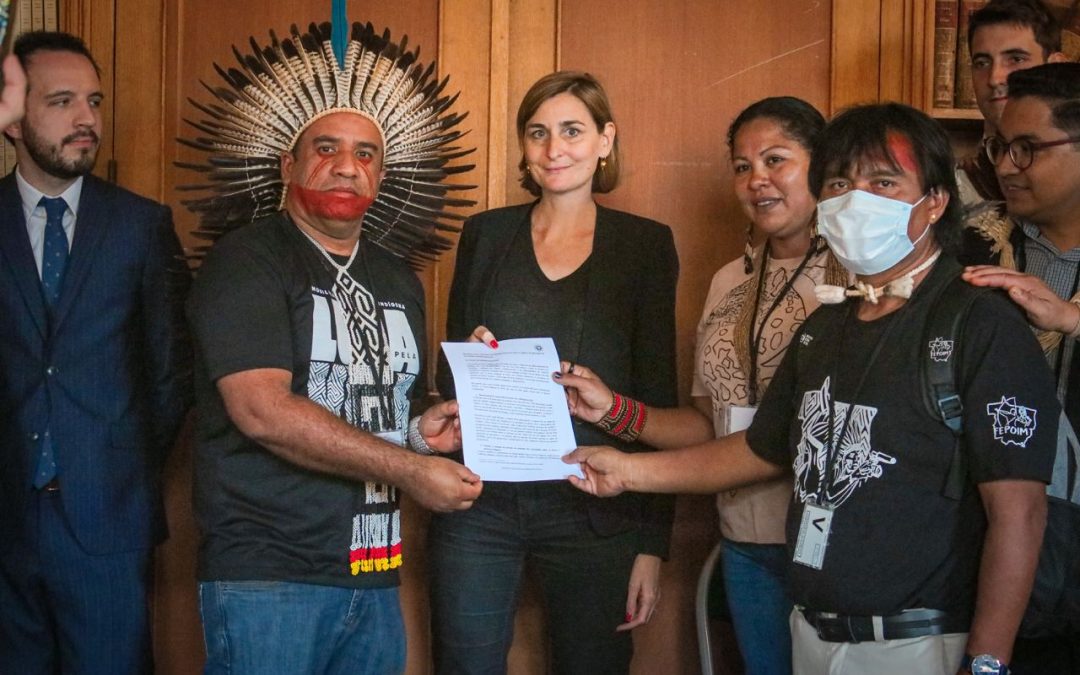
10/Jun/2022
To the Minister of Foreign Affairs
The Articulation of Indigenous Peoples of Brazil (APIB) is aware of the debate on the Law on the Importation of Forest-Risk Products (FERC) and hereby reinforces and calls on the Ministry to recognize the reality of the multidimensional impacts and responsibility of European economic and commercial dynamics on indigenous lands in Brazil. The law under debate is of paramount importance for the Indigenous Peoples of Brazil, as it directly influences the promoters of human rights violations, the demarcation of indigenous lands and the maintenance of the biodiversity that the Peoples of Brazil have been protecting and safeguarding for millennia.
To ensure that the new law has an effective and timely positive impact on climate change, the Indigenous Peoples of Brazil, through APIB, call for attention to the following considerations:
1. Territorial cut-off recognised according to FAO definition:
The current definition of forests within the draft law, according to FAO, disregards much of the Brazilian indigenous reality, since it ignores other biomes beyond the Amazon and the Atlantic Forest. The Indigenous Peoples have been facing genocide and the disappearance of their peoples and lands for more than 500 years throughout the national territory, in such a way that it is necessary to recognise the historic struggle for the maintenance of the forests, and other natural vegetation existing in Brazil.
If the current definition were taken into account, the bill would apply to only 15% of the Pantanal region, one of the biomes most affected by fires in recent years, and completely disregards the Pampas biome in the south of the country, where historical processes of invasion and occupation of indigenous lands are taking place, mainly caused by the advance of soy and cattle breeding. The Cerrado biome, responsible for safeguarding Brazil’s aquifer reserves, would have only ¼ of its area recognised as forest within FAO’s definition, being today one of the regions with significant advance of agribusiness and cattle breeding, besides the expansion of the agricultural frontier in the MATOPIBA region , which already brings impacts for soil and water contamination due to excessive use of pesticides.
2. Impacts and threats of commodity pressure on Indigenous peoples and territories.
Originally protectors and maintainers of biodiversity, today Indigenous Peoples suffer various forms of violence, threats and impacts on their lives, bodies and territories. The specific ways of life of Indigenous Peoples are intrinsically linked to the maintenance of biodiversity, natural resources and the continuity of life.
Indigenous Land is a guarantee of the future for all humanity. The relationship with territory is not one of ownership, exploitation, expropriation or appropriation, but one of respect and management of a common good, which serves all humanity. However, this fundamental portion for the survival of indigenous peoples and for the common good remains under constant threat. The pressure for deforestation in indigenous territories is intense, through invasions, mining, agricultural expansion and other illegal activities that occur within the territories, putting at risk the lives of the peoples who live there.
Violence and violations of constitutional rights are constant. The Peoples that defend and inhabit the forests face not only deforestation, fires and destruction of their biodiversity, but also live with extreme situations of violence, racism and expropriation of their original territories on a daily basis.
In addition to the impacts directly caused by the advancement of commodity production (agribusiness and livestock products), such as soil and river contamination by pesticides sprayed into the air, the invasion of indigenous lands for illegal production, deforestation and sale of illegal timber, Indigenous Peoples face direct attacks on their peoples, communities, families and bodies.
The persecution of leaders, and even their assassination, is an unfortunate reality experienced by the original peoples. Those who stand up for the defence of nature, biodiversity and the maintenance of global life are persecuted, criminalised, imprisoned and assassinated, with the complete omission of the Brazilian State. And unfortunately this persecution and violence extends to supporters of the struggle of indigenous peoples, as in the recent case of the disappearance of the indigenous activist Bruno Pereira and correspondent journalist of The Guardian, Don Philips, who were denouncing the attacks suffered by indigenous peoples in the Vale do Javari region – the second largest indigenous land in Brazil (an area almost the size of Portugal).
The invasion of land, for the illegal production of commodities, leads to direct confrontation with the original communities, exponentially increases situations of gender-based violence and abuse of minors, as well as implanting dynamics of alcohol and drug abuse through the massive arrival of invaders occupied with tree felling, mining, and cattle production.
Although constitutionally recognised since 1988, the demarcation of indigenous lands has still not been concluded in Brazil. Indigenous lands that have not yet been ratified face strong pressure from economic dynamics, which take advantage of the omission of the Brazilian State to advance over areas protected by, and guaranteed for, the indigenous peoples. Currently, this gap makes these lands vulnerable not only to the production of commodities, but also opens the way for the presence of organised crime that operate drug trafficking as well as illegal logging. The presence of criminal factions also increases the pressure on indigenous youth, not infrequently enticing and recruiting young people for organised crime.
3. Brazil’s institutional weakness regarding the protection of indigenous lands.
Relying solely on national legislations and agencies does not provide security for Indigenous Peoples, who are currently witnessing the dismantling of public policies, regulations and protective institutions.
The Bolsonaro government was responsible for the destructuring of the policy of protection and monitoring of indigenous lands, from the extinction of public resources for protection agencies to the persecution and dismissal of professionals historically committed to the indigenous agenda.
Relying on the structure of defence and protection of Indigenous Peoples that exists today in Brazil leaves serious gaps for the effectiveness of European law.
From 2010 to 2020, the area occupied by mining within indigenous lands grew 495%, according to data from Map Biomas. This represents a 41-fold increase in deforestation caused by a practice that is illegal and violent to indigenous peoples and that the Brazilian congress, pressured by President Jair Bolsonaro, intends to legalise via Bill 191/2020.
Besides this bill that intends to open the indigenous areas to devastation of the forest and of lives, there is a whole package of destruction on the agenda of the National Congress that insists on the end of demarcations and the revision of Indigenous Lands (Bill 490/2007), that legalises the illegal occupation of public lands (Bill 510/2021), among others that make the legislative protection structure of indigenous territories and peoples more flexible.
Beyond the legislative threats, there is the president of Brazil himself, who has been fulfilling his role when he stated, while still campaigning in 2018, that he would not demarcate any millimetre of indigenous land. In his government, all demarcations are stalled and are at risk of being extinguished if the Temporal Framework Thesis (Marco Temporal) is judged in Brazil’s Supreme Court. The trial of the Temporal Framework is considered the trial of the century by indigenous peoples, as it defines the future of the demarcation of territories. If the Supreme Court decides in favour of this thesis, the right to territory and their protection may be extinguished. This bill is one of the main attacks by the Legislative Branch on the rights recognised to indigenous peoples in the CF/88. It is considered by APIB as an “attempt at genocide”. The main alteration of bill 490 would end up making the demarcation of indigenous lands unviable through the incorporation into law of the thesis of the temporal landmark, as one of the taxative requirements to be observed for the recognition of traditionally occupied areas. The trial, which began in 2021, was cancelled for its third time this year.
4. Climate emergency
There is no solution to the climate crisis without Indigenous Peoples.
Climate change is more perceived by indigenous peoples because we have an intimate relationship with Mother Nature: all our sustenance comes from her and she gives us all the explanations for the phenomena that affect our lives. We understand her language. Looking at the sky, feeling the temperature, listening to the beat of the earth are things we learn from an early age, through indigenous education, which prepares us to manage the world, brings meaning to life. But everywhere we have gone we have heard personal perceptions regarding the imbalance in the climate.
Even in large urban centres many people are already noticing its effects on their daily lives.
The transformations are beginning to awaken everyone’s instincts. The Articulation of Indigenous Peoples of Brazil (Apib) is reinforcing to the world the centrality of peoples and their territories in confronting the climate crisis. We are watching governments and organisations seeking technological solutions and tools that can help the current crisis, but it is necessary to understand that the main social technology has already been developed by indigenous peoples: traditional territories and indigenous cultures.
These spaces play a fundamental role in balancing climate, thus benefiting all of humanity. But for them to be preserved, the way of life of the indigenous peoples must also be preserved. With their own way of life, indigenous people guarantee this harmony and well-being beyond their lands.
The countries of the European Union, large buyers of commodities from Brazil, can help us protect our lives and our territories. Therefore, we are here in Europe and we demand strong and ambitious guidelines for FERC, such as: (1) ensuring that all biomes are included in the legislation; (2) that the inclusion of respect for the international rights of Indigenous Peoples is maintained, due to the fragility of national legislation and (3) that this law is brought to a vote as soon as possible in the European Parliament, because with each period of delay, the destruction of our lives and territories is accelerated
The approval of FERC, with strong and ambitious guidelines for the protection of our rights and biomes is urgent, so that a message is sent to the Brazilian government and to those who benefit from the attacks on Indigenous Peoples: Europe will no longer connive with violence against Indigenous Peoples. To guarantee their rights is to guarantee the life of humanity.
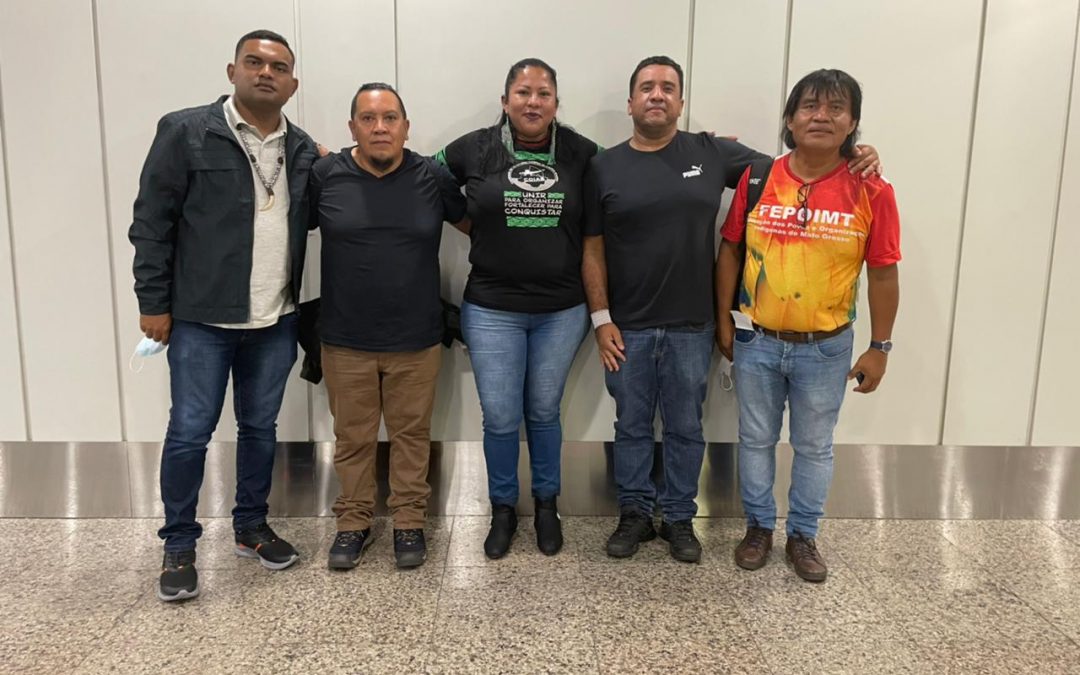
08/Jun/2022
Indigenous leaders from Brazil visit France and Belgique during the month of June as a strategy to hold governments and companies accountable for threats to the protection of their territories, as well as to reinforce the complaint at the International Criminal Court (ICC) against the Bolsonaro government for Genocide and Crimes against Humanity.
The Articulation of Indigenous Peoples of Brazil (APIB) visits Paris and Brussels from June 8th to 16th 2022 as part of its strategy to confront the genocidal and ecocidal policies of the Bolsonaro government. Its objectives are to affect the chains of extraction of products, such as gold, and the production of raw materials such as meat, soybean and leather, consumed in Europe and which leave a strong impact on the Indigenous Lands of Brazil. For this, the indigenous delegation will meet with Commissions of the European Parliament to participate in the debate on the legal proposal about a Regulation on deforestation-free products (FERC). Among the various activities, APIB is going to meet with the Brazilian delegation of the European Parliament and with the parliamentary Environmental Department, both on June 14, and with members of the German Green Party on June 15. These events are of great importance as Europe is the second largest market buying soybean produced in Brazil and a big importer of Brazilian beef.
Also during the International Tour, APIB will accompany the acts and investigations of the French supermarket group Casino suspected of lack of traceability of certain products from deforested lands or land grabbing in Brazil. The International Tour is an independent action, which is not linked to any political party or company, organized by APIB to promote political advocacy for the rights of indigenous peoples. Seven indigenous leaders, representing all regions of Brazil, cross the ocean to denounce international threats to their territories and demonstrate that their struggles go beyond Brazilian borders.
“We need urgent international action in the face of the institutional instability scenario that we are experiencing today in Brazil. A scenario promoted by hate speech, with an incidence of the Executive within the Legislative, with action or omission of the Brazilian State that promotes the invasion of indigenous lands and that weakens the institutions that should guarantee the rights of indigenous peoples, mainly FUNAI, ICMbio and Ibama. The institutions are being dismantled, with a significant increase in violations on indigenous lands with the advance of mining, illegal logging and the implementation of large enterprises without respecting biodiversity and the specificities of indigenous peoples”, explains Dinamam Tuxá, Executive Coordinator from APIB.
CASINO case: supermarkets accused of selling products linked to deforestation and land grabbing
In March 2021, indigenous organizations from Brazil and Colombia, together with a group of French NGOs, sued the retailer Casino, which owns the supermarket brands Casino, in France, Pão de Açúcar, in Brazil, and Éxito, in Colombia. The evidence presented points to a pattern of products linked to deforestation and land grabbing in Brazil and Colombia.
“We are taking action on the Casino case because, as has been shown, it purchases products from deforestation and socio-environmental conflicts. These large groups that purchase commodities in Brazil must respect the principles of traceability, as many of these products come from areas of socio-environmental conflict, encourage deforestation in the Amazon and end up violating the rights of indigenous peoples”, says Dinamam Tuxá.
Forest risk commodities (FERC) import law needs to be improved to avoid serious socio-environmental impacts
The proposed Regulation on deforestation-free products (FERC), launched in November 2021 and which will be debated and voted on by the European Union, has a direct impact on the security of indigenous lands and the biomes that these people protect. The regulation will have to define a date on which it will be prohibited to sell products that have evidence of illegal deforestation in the production chains of risky products.
The law provides for regulations on commodities (meat, leather, wood and other products) arising from deforestation and/or forest degradation, but it still has loopholes as it does not recognize mining products, soybean and frozen meat. Furthermore, the law recognizes as risky commodities only those produced in forests following FAO’s deffinition, which excludes ecosystems such as Cerrado, Caatinga, Pantanal, Pampas and others. The measure, which seeks to require foreign importers to monitor the supply chain, excludes a good part of natural environments that are at high risk of destruction and does not specifically consider the negative impacts on indigenous peoples who suffer the consequences of productive and extractive activities.
Mining in Indigenous Lands: the struggle to legalize a predatory activity with indigenous peoples and the environment
The European mechanisms for regulating the gold market only consider certain countries with recognized conflicts to be traceable, but Brazil is not included despite being one of the main exporters of gold extracted from illicit mining in Indigenous Lands or with impacts both environmental and health in indigenous peoples. In Brazil, there is a lack of control over the traceability of gold production, according to a study carried out by the Environmental Services Management Laboratory (UFMG) together with the Federal Public Ministry. The gold declarations in the Financial Contribution for the Exploration of Mineral Resources from 2019 to 2020 showed that only one third of the gold corresponded to the declared origin, with another third being clearly illicit and last third it was not possible to verify its origin.
From 2010 to 2020, the area within indigenous lands occupied by mining grew by 495%, according to data from Map Biomas. Even though the violent consequences of the installation of mining in indigenous lands have been verified, the Brazilian Congress, pressured by President Jair Bolsonaro, intends to legalize such activity with Bill 191/2020. Also, the proposal of Bill 490/2007 pretends to paralyze the demarcations and review Indigenous Lands already demarcated, and the Bill 510/2021 intends to legalize the land grabbing. These are some measures that constitute an anti-indigenous agenda in the National Congress.
“We are going to talk to the European Parliament in order to bring up this concern of institutional instability in Brazil, our democracy is very fragile. We need to try to get the countries of the international scenario to intercede in the Brazilian Parliament in order to put some pressure on them in order to avoid the approval of those Bills violating our rights. In addition, certain trade agreements between Brazil and the European Union can increase deforestation in the Amazon and, in particular, violence against indigenous peoples in all Brazilian biomes”, explains Dinamam Tuxá.
The thesis of the “marco temporal” (temporal milestone) and the risks for the guarantee of Indigenous Lands
In addition to the legislative threats, the President of Brazil has been carrying out his threats: while campaigning in 2018, he said that he would not demarcate any millimeter of indigenous land and so far all demarcations are paralyzed. The right to recognize and demarcate areas traditionally occupied by indigenous peoples runs the risk of being extinguished if the temporal milestone of PL 490, also known as Marco Temporal, is incorporated into the law by the Federal Supreme Court of Brazil. This Bill is one of the main attacks by the Legislative Power on the rights recognized to indigenous peoples in the Federal Constitution of 88 and APIB considers it an “attempted genocide”.
The trial, which began in 2021, was postponed for the third time on June 5th. The session was scheduled for June 23rd 2022 and APIB was preparing to occupy Brasília for the trial. (Read more about the postponement of the Timeframe vote).
“As much as we became aware of the possibility of suspending the judgment of the time frame thesis on the 23rd, this means a lot beyond postponement. This is also a reflection of the political pressure caused by this conjuncture and by a speech of structural and institutional racism promoted by the executive headed by the President of the Republic Jair Bolsonaro. It forces us to make advocacy campaigns within an international scenario to prevent these violations. The institutions of Brazil are being silent and the only actions that are being promoted are mainly focused on the withdrawal and violation of our rights”, says Dinamam Tuxá.
Aims of the awareness campaign across Europe
The benefit of protecting indigenous territories is not just for their own peoples: Indigenous Lands are a guarantee of the future for humanity. Therefore, everyone must be responsible for protecting these territories. The relationship with the territory is not one of ownership, exploitation, expropriation or appropriation, but of respect and management of a common good, which serves all humanity. However, the survival of indigenous peoples remains under constant threat. The pressure for deforestation in indigenous territories is intense, through invasions, mining, agricultural expansion and other illegal activities, putting indigenous people’s lives at risk.
We aim for the European Union, as a major consumer of Brazilian agricultural commodities and one of the largest buyers of gold in Brazil:
– take responsibility for their production chains
– impose measures and restrictions to ensure that products imported into European countries do not contain the blood of indigenous peoples
– join the struggle of indigenous peoples and put pressure on the Brazilian government to establish emergency measures to eliminate the genocide of its peoples.
About the Articulation of Indigenous Peoples of Brazil (APIB)
APIB is the largest instance of representation of the Brazilian indigenous movement and has, since its creation, fulfilled its commitment to fight for the guarantee of the constitutional rights of Indigenous Peoples. Whether nationally or internationally, APIB and its seven grassroots organizations are mobilized to protect territories, communities and people.
The Indigenous Peoples, articulated through their regional organizations and APIB, seek in all instances the accountability of those responsible for this destruction. Internationally, APIB, in addition to participating in climate events and debates, seeks to make the agents responsible for the dynamics of invasion, illegal exploitation and destruction of indigenous territories accountable, as well as influencing the debate on the formulation of the new Regulation on deforestation-free products (FERC). In Brazil, APIB has historically mobilized the indigenous movement and faced the anti-indigenous policies that are being processed in the Federal Supreme Court and in the Chamber of Deputies, forming the front line of protection of Indigenous Peoples and Lands, and consequently, of the environment and the environment’s future.
Apib, as a national reference for the indigenous movement in Brazil, brings together regional indigenous organizations and was created with the purpose of strengthening the union of peoples, the articulation between the different regions and indigenous organizations in the country. To protect indigenous territories and ensure respect for constitutional rights, APIB resists and advances on different scales.
For more information and to schedule interviews, you can contact the press service:
(61) 982124182
[email protected]
[email protected]
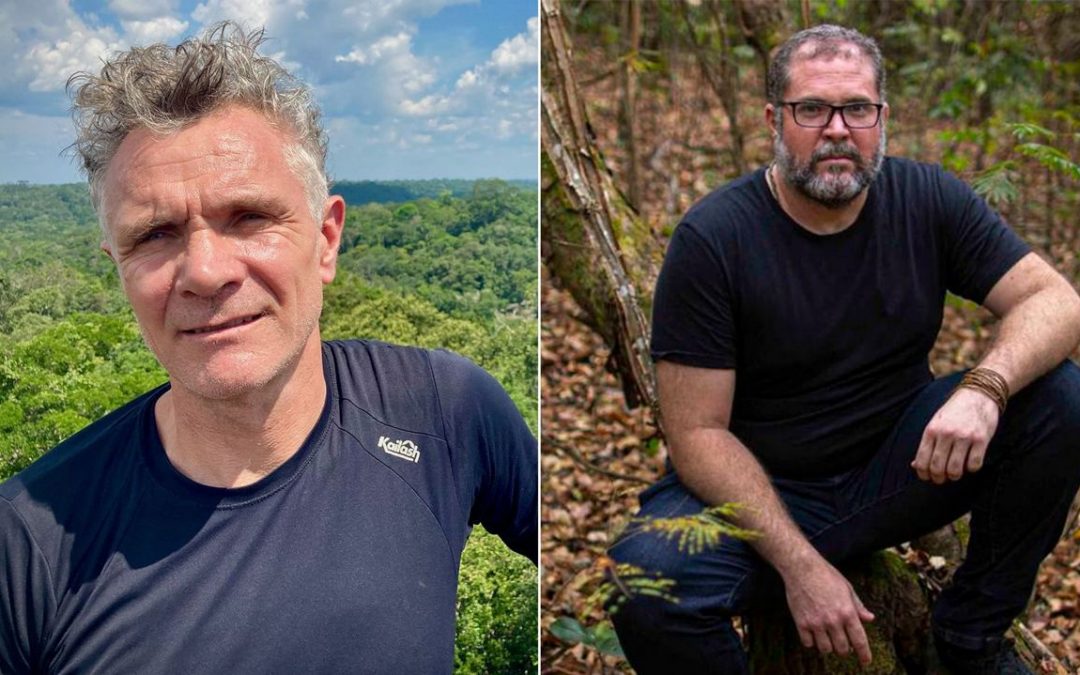
08/Jun/2022
The Union of Indigenous Peoples of the Javari Valley (UNIVAJA), the Observatory for Human Rights of Isolated and Recently Contacted Indigenous Peoples (OPI) and the Coordination of Indigenous Organizations of the Brazilian Amazon (COIAB) inform the public that the expert on Indigenous issues Bruno Pereira and the British journalist Dom Phillips have been missing since Sunday morning, June 5th. They were traveling in a small boat from the community of São Rafael to the city of Atalaia do Norte on the Itaquaí river, a tributary of the Javari river, in the State of Amazonas.
Throughout the day on Monday, June 6, the UNIVAJA Patrol Team contacted and solicited action from institutions that operate in this frontier region in order to expand the search effort that the Indigenous team began conducting Sunday, June 5. Their searches during this period failed to locate the two missing men. The Army’s Solimões Border Command/8th Jungle Infantry, the Tabatinga Fluvial Captaincy, the Tabatinga Federal Police, the 8th Battalion of the Military Police and the Federal Public Prosecutor of Tabatinga were all called upon.
With the exception of 6 military police officers and a team from FUNAI (the federal National Indian Foundation), who joined searches with UNIVAJA yesterday (Monday, June 6), the federal agencies mentioned and the armed forces have so far been absent from the search effort. A request to deploy 25 personnel has not been acted upon by the Brazilian Army. The Federal Police sent just a single agent to Atalaia do Norte with officials from the Navy yesterday. We underscore that no task force has been constituted for search operations.
UNIVAJA and the federal Public Defender (DPU) resorted to the Federal Justice System (petition number 1004249-82.2018.4.01.3200) requesting: “a) The Federal government facilitate the use of helicopters by the Federal Police, be they from the Security Forces or the Armed Forces, in light of the fact that at the present moment there are no helicopters, which are essential, supporting the search; b) expansion of the search teams; c) expansion of the number of boats.” The UNIVAJA petition was made due to the need for both aerial and ground-level searching. We underscore that in this region there are Army border troops available. Up until the present moment there are ample Army troops stationed in the area. So far, however, the number of agents made available is miniscule in relation to the urgency to locating Pereira and Phillips.
All day on June 6, UNIVAJA’s requests had the support of members of Congress and the Senate. The Indigenous Caucus presented an official letter to the Ministry of Justice and Public Safety, the national Directorate of the Federal Police and the Superintendent of the Federal Police in Manaus. The offices of Senators Randolfe Rodrigues (REDE) and Jaques Wagner (PT/BA), the minority leadership of the Chamber of Deputies, reiterated the requests to the Ministry of Justice to deploy additional personnel to the search.
On the afternoon of June 6, the Amazon Military Command (CMA) published a note informing the public that it was capable of a “humanitarian search and rescue mission” but that action would only be taken with authorization from the “higher ranks” of the military. Given that the military’s Amazon authorities are expressly endowed with the logistical capacity, infrastructure, operational abilities, and capabilities for immediate intervention, we are perplexed by the delay, hesitation and slow pace of the “higher ranks” in implementing search-and-rescue procedures.
This morning the Special Press Office of the External Relations Ministry (Itamaraty) published a note stating that “the Federal Police Department is engaging in that region and taking all measures to locate them as quickly as possible. The Federal Police made multiple trips collaborating with the Brazilian Navy, which joined the effort to find the two citizens.” This information from the Brazilian government is not true. As of yesterday, the Navy had not initiated any search activities and only a single Federal Police officer had been sent to the area in question.
The principal facts available at this time are that the Civil Police detained two of the main suspects for questioning on Monday evening. They are fishermen identified only by their nicknames, “Churrasco” and “Jâneo.” The two were taken to Atalaia do Norte to provide information to the police. According to the Indigenous organization, the two suspects were released after the intervention of the municipal government of Atalaia do Norte. There is information that a third suspect, known as “Pelado,” is at large in the forest, in the region of the river communities of São Rafael and São Gabriel.
Faced with chaotic situation, UNIVAJA called all relevant institutions to a situation room this morning, June 7, in Atalaia do Norte. The only representatives of government were the six military police agents previously mentioned.
Today the search continues. Groups comprised of UNIVAJA Patrol Teams (EVU) and the Military Police are searching for the two missing men, as well as the suspect reported to be hiding in the forest.
The region where these events are occurring is the stage for serious conflicts and a climate of violence in which loggers, illegal fishermen, and international drug traffickers operate in and around the Javari Valley Indigenous Territory, encouraged by the negligence of the public entities responsible for protection of monitoring of Indigenous lands. This scenario demands an organized, well-coordinated intervention by public safety forces, in close dialogue and cooperation with the local Indigenous organizations, which have led the search effort and investigation from the moment Bruno Pereira and Dom Phillips’ absence became apparent.
These events had a tragic precedent in 2019 when the FUNAI contractor Maxciel Pereira dos Santos, of the Javari Valley’s Enthoenvironmental Protection Front, was brutally assassinated by gunmen in Tabatinga. The sense of impunity has grown as Maxciel’s murder, perpetrated, as far as we can determine, by invaders of the Indigenous territory, has remained officially unsolved. The FUNAI protection base on the Ituí river, close to the location of the current incident, has also come under attack, with eight episodes of armed violence against FUNAI agents and the Indigenous personnel working at the base. These and additional incidents have been systematically reported to the authorities by Indigenous organizations, including an action brought by the Articulation of Indigenous Peoples of Brazil in the Supreme Federal Tribunal under the ADPF number 709.
Given this panorama, the need for immediate investigation and a swift search are of the utmost urgency. Every hour that passes decreases the possibilities that the two missing men will be rescued, while cementing the reign of increasingly confident criminals in a land made lawless by an absent State.
Yesterday information circulated about the limitations of the security forces to obtain, among other resources, helicopters to provide the needed support to search operations. This support to river-based teams is essential given the geographic conditions of the region. The armed forces and public safety apparatus should not spare the effort needed to guarantee basic rights, which are endangered in the current conditions that prevail in the Javari Valley.
In this region, violent invasion of Indigenous and other federal lands and repression of the free press threaten the practice of journalism and the very lives of public servants doing their constitutional duties. Given this drastic fracturing of our democracy’s foundations, the effective and swift intervention of the Brazilian government to locate the expert Bruno Araújo Pereira and British journalist Dom Phillips is of the utmost urgency.
We are watching, yet again, as the Bolsonaro government abandons its responsibilities amid escalating violence against Indigenous peoples and defenders of human rights in Brazil. UNIVAJA, the Indigenous movement, and their allies, by contrast are sparing no effort, working constantly in the area of the incident to find our friends Bruno and Dom.
Atalaia do Norte, Amazonas, June 7 2022
Union of Indigenous Peoples of the Javari Valley – UNIVAJA
Observatory of Human Rights of Isolated and Recently Contacted Indigenous Peoples – Opi
Coordination of Indigenous Organizations of the Brazilian Amazon – COIAB
Articulation of Indigenous Peoples of Brazil – APIB
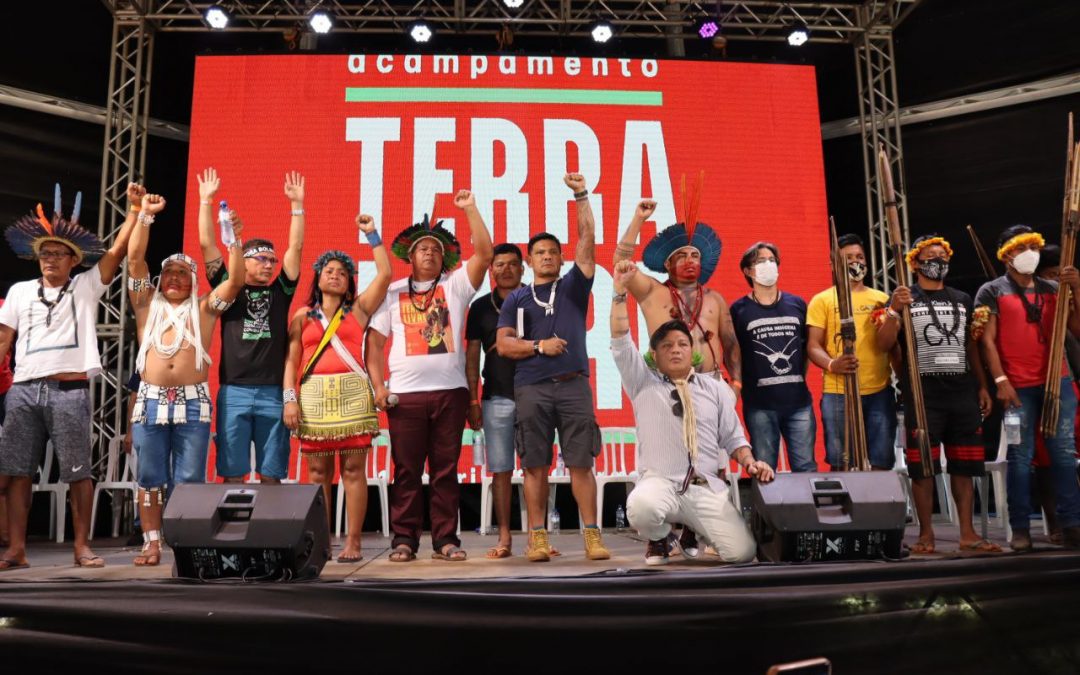
07/Apr/2022
Photo: Pure Juma| COIAB’S communicator
At the Acampamento Terra Livre, in Brasilia, the panel “For the lives of isolated indigenous peoples and recent contact” warned about the attacks and setbacks suffered under the Bolsonaro government
The panel discussion was held this Thursday afternoon, 7, during the 18th Free Land Camp, and was mediated by the Executive Coordinator of Coiab, Angela Kaxuyana, with the participation of Tambura Amondawa, Adriano Karipuna, Junio Yanomami, from Roraima, Ronilson Guajajara, from Maranhão, Beto Marubo (Univaja), Lindomar Terena, Paulo Tupiniquim, Alfredo Marubo, Gilson Mayoruna and Luis Ventura, representative of the Indigenous Missionary Council (Cimi).
Many people do not know, but in Brazil there are several indigenous peoples who have chosen to live away from imposed “civilization”. They are peoples who, for centuries, have resisted colonization and the process of violence since the arrival of the white invader on Brazilian lands.
By choosing to remain in isolation, they seek to have greater control over the relationships they establish with groups or people around them and to continue living by their means, practices and habits. However, in recent years, under the Bolsonaro Government, the Brazilian State has refused to recognise their existence and guarantee their rights.
Beto Marubo, a member of the Union of Indigenous Peoples of the Javari Valley (Univaja), attributed the setbacks in the policy of protecting isolated indigenous people to a Bolsonaro policy of genocide of indigenous peoples, which has made the National Indian Foundation (Funai) a threat.
“The Funai was created to protect and should have a responsibility towards these Peoples. Although they are free, they are very vulnerable. Do you know what Funai is doing now? It is denying [the existence of] these Peoples,” emphasized Beto Marubo during the table.
To aggravate the situation, even today there are religious missions that have the intention of colonising the original culture. This represents a great epidemiological threat, which is added to deforestation and the invasion of groups that practice illegal extraction of gold, ore, wood and hunting for trade in these regions.
The Yanomami people are among those who have had the most recent contact. A video was shown with images of the mines inside their territories, the same ones that Bolsonaro proposes to regularize with PL 191. The scenario further accentuates the health problems that the isolated peoples have been facing.
Indigenous leader Júnior Hekurari, of the Yanomami people, president of the District Council for Indigenous Health Yanomami and Ye’kwana (Condisi-YY), stressed that several complaints have already been made at the national and international level about the violence suffered by the isolated and recently contacted peoples in their territories.
“The indigenous land is being invaded by miners. Our relatives are suffering from pneumonia. Every day a Yanomami child dies, the mothers cry together with the forest. More than 25 thousand miners are inside our lands, the miners have taken over the health centers, and the indigenous people are calling for help”, said the Indigenous leader.
Júnior estimated that around 7,000 are sick with malaria. In 2021 alone, 300 children died of the disease, almost one per day. For him, the policy of the Bolsonaro government promotes risk and extermination. “Now Sesai has become a military barrack. There are many colonels, many soldiers working there. The federal government does not plan to guarantee assistance within the community,” he lamented.
Alfredo Marubo, pointed out the deviations in the actions of Funai in this process. “Every day tons of game meat passes in front of the Funai headquarters and nobody does anything. They are doing nothing, they say that we are lying, they do nothing and even threaten the Peoples. Bolsonaro is putting anti-indigenous people to look after the villages, but they just go there for a walk and leave”.
With the ineffectiveness of federal bodies in protecting indigenous rights, exploitation has advanced over the forests and is getting closer every day to the isolated peoples.
In the plenary, the Peoples who had the first contacts centuries ago showed solidarity with these Peoples who are living autonomously in the forest. “We demand respect. We are using this cursed language because we were forced, we were humiliated. We saw our children growing up and dying. Today what is happening in the Amazon, we have already suffered. So we are here to say that you are not alone. We are together. This house belongs to the Indigenous Peoples of Brazil”, chief Júnior Pataxó,from the South of Bahia, expressed solidarity.
The Executive Coordinator of Coiab, Angela Kaxuyana, stressed the importance of this union for the protection of the isolated Peoples, since the Brazilian State has not fulfilled its role of protecting their territories, putting at risk the lives of these Peoples who decided to live in isolation after fleeing from massacres.
“On behalf of COIAB, of the Amazon, we want to express our gratitude and send a message to Bolsonaro that the Amazon is not alone, that it is the essence of this indigenous movement that will win, it is this essence of the indigenous movement that must remain here in the camp of respect, solidarity and a demonstration that we are together. And we have always known, my relatives, that we are never alone, because the Northeast and Apoinme are together with the Amazon”, Angela Kaxuyana concluded.
Deforestation alerts
In 2021, deforestation increased in indigenous lands with the presence of isolated indigenous Peoples, according to the Sirad-I bulletin of the Socio-environmental Institute (ISA). In the year, 3,220 hectares were deforested, with 904 alerts within the territories.
The alerts were concentrated, mainly, in the Piripkura (MT), Uru-Eu-Wau-Wau (RO), Araribóia (MA) and Munduruku (PA) Indigenous Lands. In addition, throughout 2021, it was also possible to detect major deforestation on the edges of these territories, which indicates a tendency of increasing invasions against the territories of these isolated Peoples.
The Araribóia Indigenous Land, located in Maranhão, was one of the most devastated by invasions by loggers and land grabbers, with more than 380 hectares deforested inside it. In addition, in 2021, arson attacks punished the territory.
Isolated or Decimated
The isolated or decimated campaign is headed by the Coordination of Indigenous Organizations of the Brazilian Amazon (COIAB) and the Observatory of Human Rights of the Isolated and Newly-Contacted Indigenous Peoples (Opi), and includes the participation of other organizations in the socio-environmental field, such as ISA, Survival International and Operation Native Amazon (OPAN). Launched on August 20, 2021, the campaign is focused on pressuring Funai for the renewal of four ordinances: Piripkura Indigenous Lands (MT), Jacareúba/Katawixi (AM) and Piriti (RR) and Ituna-Itatá IT (PA).
ACCESS: https://www.isoladosoudizimados.org/
Since last year, several actions have been carried out in order to alert public opinion to the current condition of isolated indigenous Peoples who are at risk of losing their territories, without legal and effective protection.
At the end of November 2021, Coiab launched a manifesto in defense of the life of isolated indigenous peoples, where it highlighted that the growing attacks and pressures on the territories are linked to the gradual weakening of FUNAI’s indigenous policy and the strengthening of the government’s anti-indigenous agenda.
Faced with the setbacks of protection by State agencies, the indigenous movement, together with its allies, is strengthening strategies to contain the invasions in the Indigenous Lands, with monitoring and autonomous protection actions in the territory, in order to protect their “isolated relatives”. In addition, they have made numerous complaints and brought legal actions to guarantee the legal protection of their territories and ways of life.
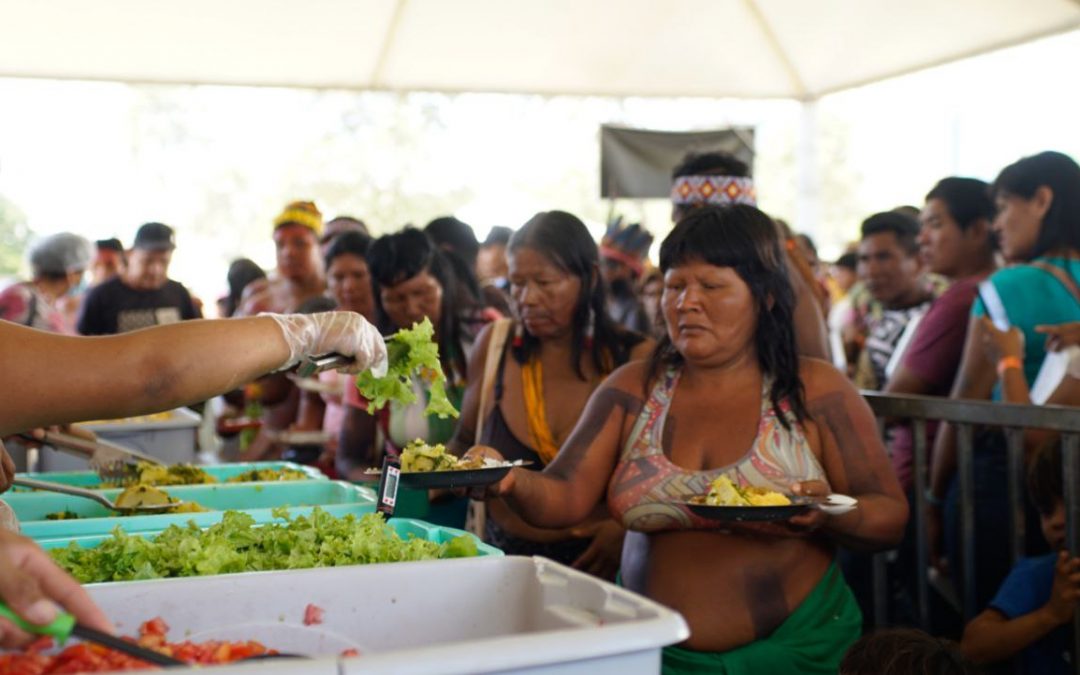
07/Apr/2022
By Geanini Hackbardt For Articulação dos Povos Indígenas do Brasil – Apib
Close to the plenary tent of the 18th Free Land Camp, it is possible to hear the noise of pans beating, knives cutting and see the food loads arriving all the time. The heat of the cookers in full steam spreads an aroma of abundant and tasty food. Food here has history and the taste of struggle. It is not just anyone’s mission to satisfy the hunger of the more than 7 thousand Indigenous from 200 different Peoples present in Brasilia up to now. And this challenge fell to the warriors of the Landless Workers’ Movement (MST).
Over 400 kilos of meat, two tons of rice and about two tons of beans are served daily in this kitchen, prepared by the careful hands of 31 men and women from the countryside, with the guidance of 3 nutritionists. Nilma de Jesus Ribeiro, from the Roseli Nunes Settlement, coordinates the team and says that “as MST, we always try to work with organic food. Everything we are doing here at the Indigenous Camp is organic and healthy. We use only natural spices, lots of garlic and onions, because it is the garlic that gives flavour to the food, there is no need to use condiments that have a lot of chemistry. It’s very interesting because we start to learn from each other’s culture”.
This space, however, does not only feed the body. The ATL 2022 kitchen feeds the dream of those who believe in the much needed unity of the peoples to take back Brazil. This is what Dinamam Tuxá, Apoinme’s representative and Apib’s executive coordinator, explains to us. “At this moment the ATL seeks to implement healthier food for our People, with an identity that comes with the struggle. All the food that comes here is the result of a history of resistance, the history of the MST, which is also fighting for its territories. Fighting for their space, for Agrarian Reform. And we have agendas in common. For several years, we have been walking together, but always in a political field. Sometimes we have a joint struggle in practice, but this was diffused within the field of action of the social movements and in the Acampamento Terra Livre we managed to materialize the struggle of the indigenous peoples and the struggle of the MST, represented through their food”.
The food comes from agrarian reform areas of the Federal District and surrounding areas, such as the Oziel Alves, Pequeno Wiliam and Roseli Nunes settlements and from the states of Goiás, Rio Grande do Sul and Minas Gerais, says Adonildo Rodrigues Souza, MST coordinator and camper from the 8 de Março area in Planaltina. For him the work in the kitchen is the practice of solidarity which only exists among the working class. “For us, this space is of great importance, not only for the kitchen to be set up, but for the cultivation of the relationship of solidarity. Despite the little difference we have, it is the causes, the agendas that unite us to fight against this fascist government that every day tries to harm us, workers. It is clear that this government acts to exterminate the poor”, he says.
He explains that the menu was designed to cover the cultural diversity of Brazil and the follow up of professional nutritionists seeks to nurture and strengthen the fight. “How in a country like Brazil, where there is no investment in family farming and agrarian reform, can we get so much food from agriculture, without any policy for this? The ones who feed the Brazilian people are family farmers,” says Adonildo. And Nilma proudly shows the food in stock. “We are offering the best of what we have, cassava, couscous, yams, sweet potatoes, bananas, oranges. The meat is also all organic”.
Dinamam highlights the presence of the MST in this edition of ATL as an intentionality. “We know that this unity is what we need to combat this evil that has been installed in Brazil. This evil of hate, of structural racism, of institutional racism that these two movements have been feeling, especially with this policy that does not recognise family farming, that does not recognise traditional farming, that does not encourage actions aimed at strengthening our traditional and family practices. So, we took the decision to unite to strengthen our production chain, to strengthen this relationship that is more than just political, it is a relationship of struggle. This is a unity for all Brazilian people, in the name of the common good.
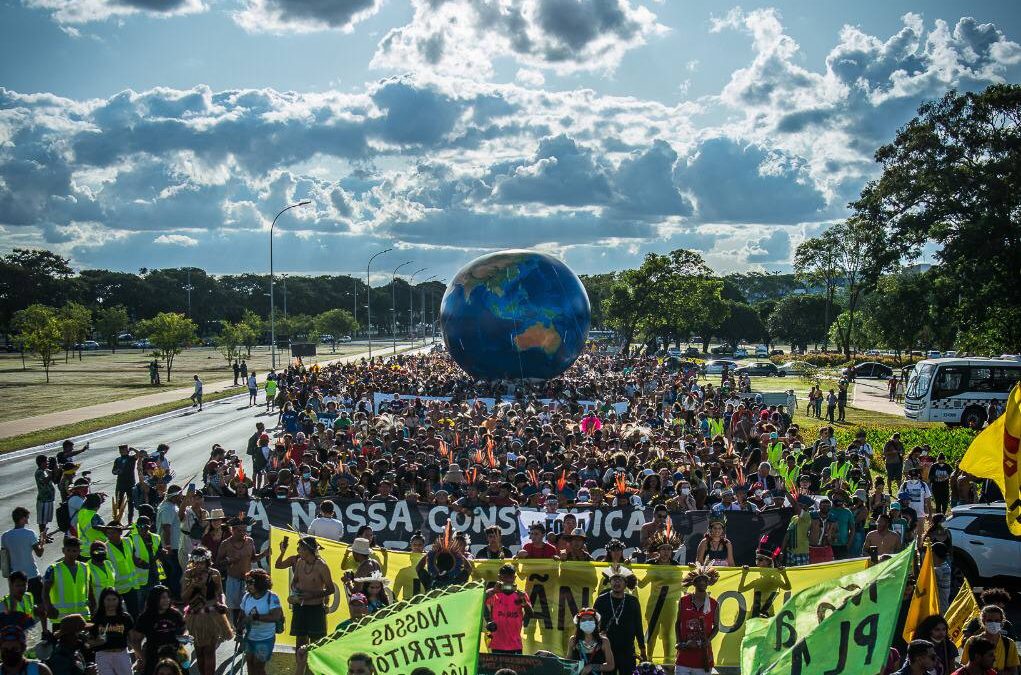
07/Apr/2022
More than 7 thousand indigenous people, from 200 peoples of Brazil, marched for the demarcation of territories and against the anti-indigenous agenda of the Brazilian government; the march was part of the ATL 2022 programme
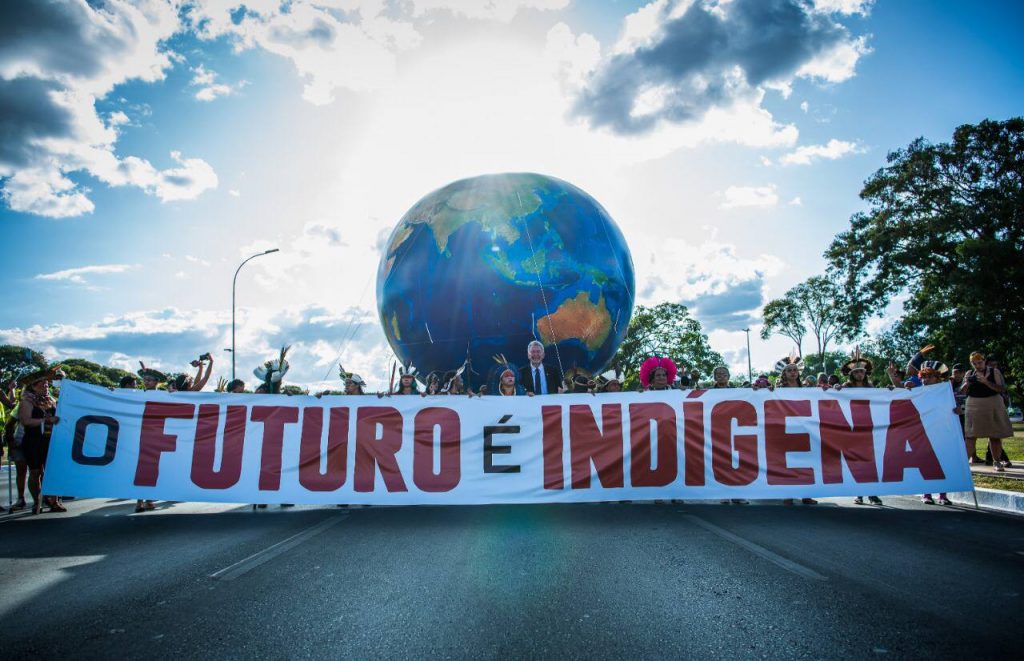
The strength of the indigenous peoples took over the streets of the federal capital on the afternoon of Wednesday (6): with banners and chants, more than 7 thousand indigenous people from 200 peoples from all regions of the country marched in defense of the demarcation of territories and against the anti-indigenous agenda of the Brazilian government. The march was part of the programme of the 18th Free Land Camp (Acampamento Terra Livre – ATL) 2022, located outside the Funarte Cultural Complex, on the Monumental Axis in Brasilia.
The final destination of the march was the National Congress, where projects that violate the rights of indigenous peoples are being processed, such as Bill 191/2020, which opens the way for the exploitation of the lands of Indigenous peoples, and the bill 490/2007, which makes the demarcation of indigenous lands unfeasible in practice.
During the mobilization, leaders spoke from a sound car and stressed the importance of arriving in Brasilia this week to fight for the indigenous cause.
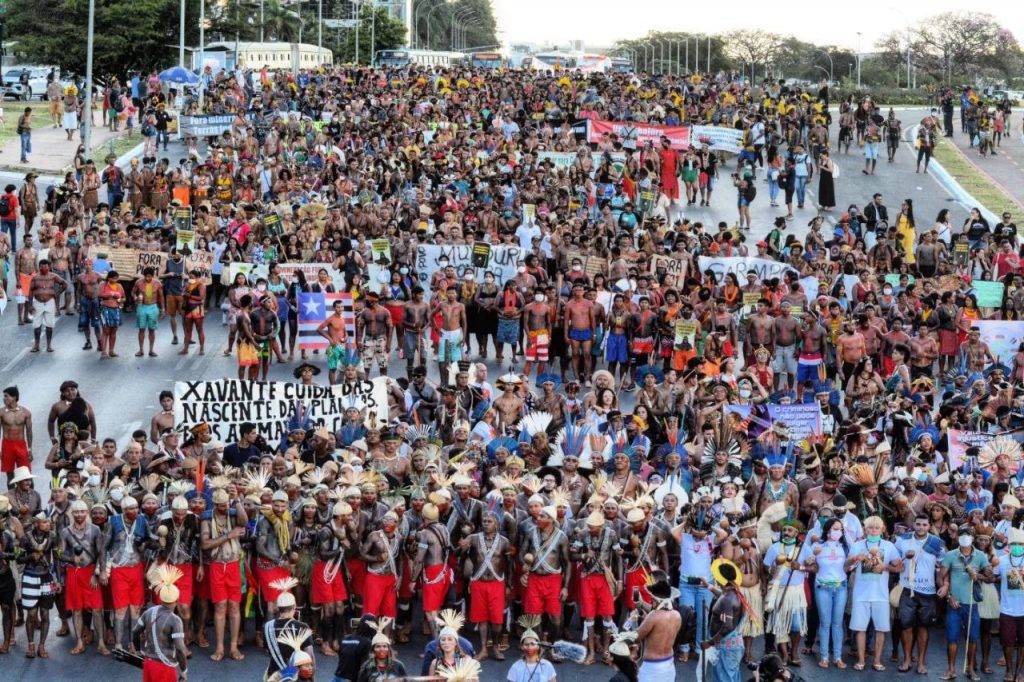
Samuel Gavião spoke about his struggle, as a student, to win the rights protected by the 1988 Federal Constitution. “We are studying to seek our right, what is ours. We have to fight. Our relatives trust us and put us forward to fight alongside them, to return to our lands. We will not give up. We will fight with strength, we are not a minority, we are many. We will fight until the end, while we are alive”, he said.
Also present at the march, Agnaldo Francisco, Pataxó Hã-Hã-Hãe leader and general coordinator of the United Movement of Indigenous Peoples and Organizations of Bahia (Mupoiba), commented on the first march of ATL 2022, named “Demarcation Now”.
“This act today [6] is very important to show Brazilian society that people will not be able to live without the demarcation of our territories, because if the territory is not demarcated, a project of death will be implemented. Death not only for us [indigenous peoples], but for all Brazilians, for the whole planet. The demarcation of our territory means the preservation of the environment, it means preserving and reducing the depletion of the ozone layer”, explained the Mupoiba coordinator.
ATL 2022
Considered the largest indigenous mobilization in Brazil, the camp takes place at the same time that the National Congress and the government are voting on projects that violate the rights of indigenous peoples.
The mobilisation is organised by the Articulation of the Indigenous Peoples of Brazil (Apib), which returns to Brasília this year with the theme ‘Retaking Brazil: Demarcate the Territories and Indigenize thePolitics’. The ATL closes on April 14.
Access the programme here.
Milestone Thesis (Tese do Marco Temporal)
On the first day of the camp, Sônia Guajajara, executive coordinator of Apib, said during a press conference that the peoples are preparing to return in June to the capital, when the Federal Supreme Court (STF) will judge the Milestone Thesis. This trial will define the future of indigenous land demarcations in Brazil.
Apib highlights that the Milestone Thesis restricts the right of communities to the lands they traditionally occupy and is repudiated by indigenous peoples, who point to the thesis as unconstitutional.
In 2019, the STF recognised the general repercussion of Extraordinary Appeal (RE) 1.017.365, a case that discusses a repossession suit filed against the Xokleng people in Santa Catarina. This means that the decision taken in this trial will have consequences for all the indigenous lands and Peoples in Brazil.
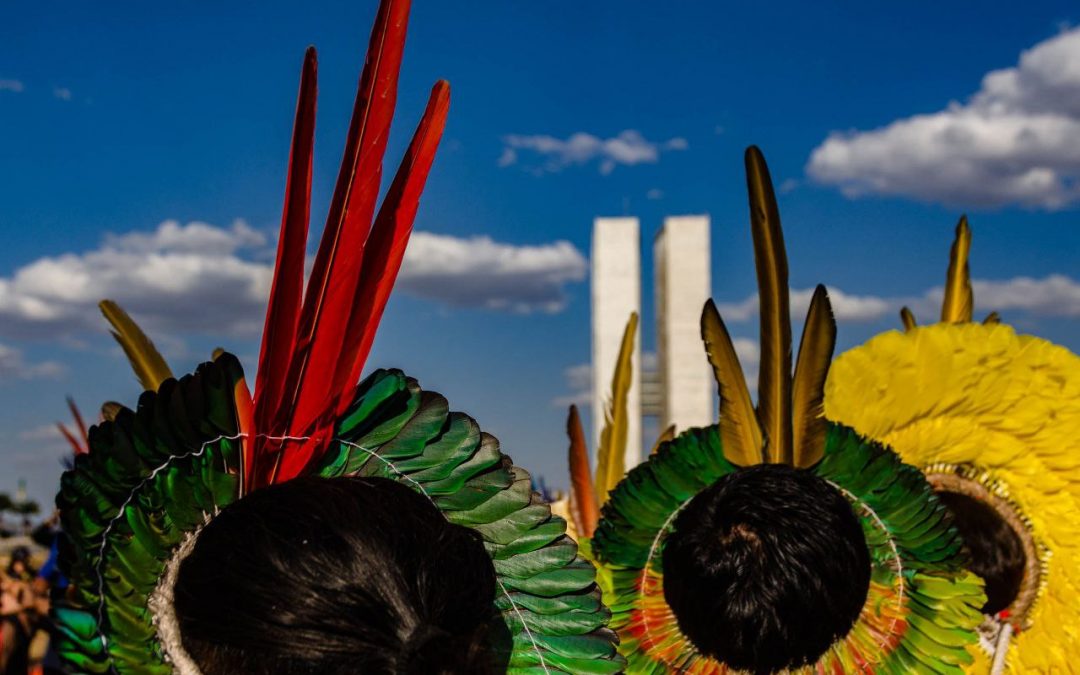
04/Apr/2022
Considered the largest indigenous mobilization in Brazil, the ATL completes 18 years and will take place between 04 and 14 April
The Articulation of the Indigenous Peoples of Brazil (Apib) will hold the 18th edition of the Free Land Encampment (Acampamento Terra Livre – ATL) between 4 and 14 April, in Brasília (Federal District). With the theme ‘Retaking Brazil: Demarcate the territories and Indigenize the politics, in 2022 the mobilization returns to Brasilia after two years of online activities due to the Covid-19 pandemic.
The Encampment will take place in the same period in which the National Congress and the Federal Government are voting on projects that violate the rights of indigenous peoples such as Bill 191/2020. The bill opens indigenous lands – most of them located in the Amazon – to large-scale exploitation, such as mining, hydroelectric dams and other infrastructure projects.
On March 9, 2022, the plenary of the Brazilian Congress approved the request of the government leader for the urgent processing of PL 191/2020. It means the proposal will be analyzed by a working group and will be included for a vote in plenary between 12 and 13 April – during the ATL.
The Encampment also takes place in parallel with, climate litigation actions are also being judged by the Supreme Court that directly dialogue with indigenous claims. In addition to such climate litigation, APIB warns about the trial of the Milestone Thesis that will be resumed in the Supreme Court within this semester; and also for the Package of Destruction – a set of measures planned to be voted in Congress this year and and which has the power to accelerate deforestation and weaken environmental legislation.
ATL’s Program
The ATL will have ten days of programming and over 40 activities. In addition to confronting the anti-indigenous agenda, indigenous health and education and the role of youth are some of the topics that will be part of the debates.
Expecting to mobilize more than 100 indigenous ethnics groups from all regions of the country, and adding this cultural diversity to the political demands, the first week of the camp will be marked by the debate “Indigenize the Politics: We stand for those who came before us, we stand for us and we stand for those who are to come”, which aims to strengthen indigenous women for Elections 2022. Also part of the first week’s program are plenaries on the struggle for life, impacts on the judiciary, demarcation and public policies.
Closing the ATL, the second week’s programme will have a plenary on the LGBTQIA+ population, articulation with other social movements and a call for actions.
Sonia Guajajara, executive coordinator of Apib says:
“Since the first days of this government we have been shouting and denouncing the persecutions against the indigenous peoples. There are innumerable threats due to the failure to demarcate our lands, in addition to deforestation and invasion of our territories. They act on two fronts: the persecutions against our leaders who oppose this misgovernment of Jair Bolsonaro; and the Congress trying to use the ink of the pen to massacre us”.
Dinamam Tuxá, executive coordinator of Apib says:
“We are in an election year and to start our journey of struggles we declare that this is the last year of the genocidal government of Jair Bolsonaro. Our Indigenous April will be marked by symbolic actions that will show our capacity in fight for demarcation and villagisation in Brazilian politics”
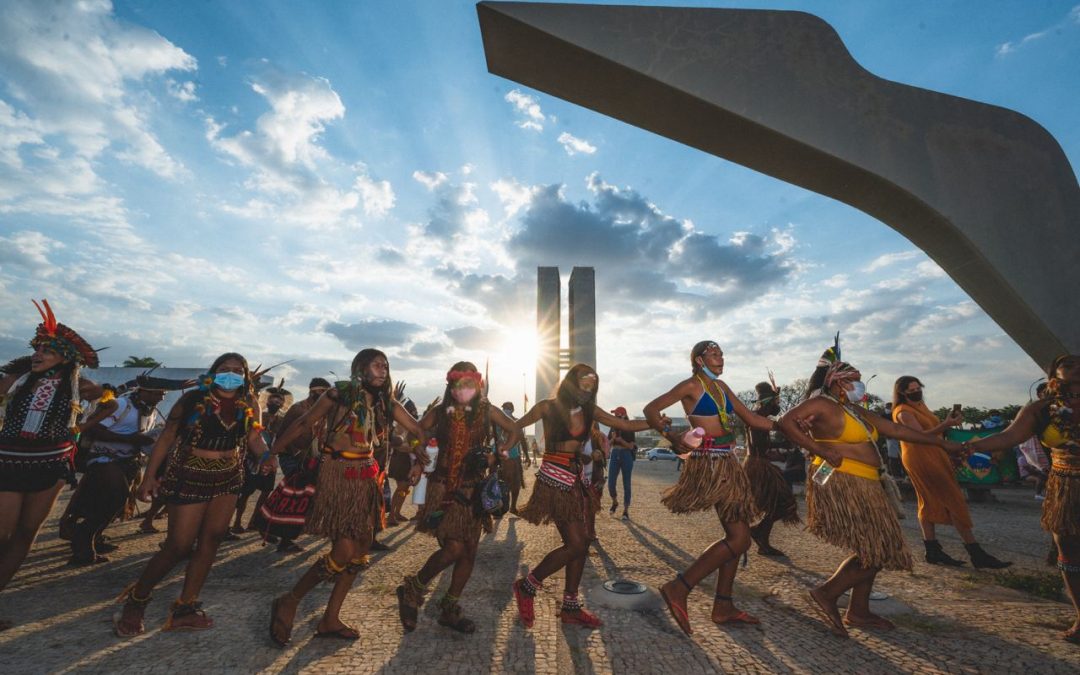
17/Mar/2022
Support Free Land Camp 2022 here
Full schedule coming soon
We are at the 18th Edition of Free Land Camp (Acampamento Terra Livre ATL in Portuguese), after two years of virtual performance, due to the Covid-19 pandemic, in which we lost many of our own. However, we continue with the forces of ancestry, getting back up to return to face-to-face actions with the theme: “Retaking Brazil: Demarcate the Territories and Indigenize the Politics”. This year, we will occupy the federal capital from April 4th to 14th.
We are in an election year in Brazil and to start our journey of struggles, we declare this to be the last year of the Genocidal government. Our “Indigenous April” will be marked by symbolic actions that will show our ability to fight for the demarcation and indigenization of Brazilian politics.
We start from the efforts in virtual and territories places of political and social action, based on our ancestral wisdom, in the care for the people and for the Brazilian territory to say: “yes, politics will be an indigenous territory!”. Our aim is to promote good living, reforest minds and indigenize politics. A joint and democratic way of deciding and leading futures.
We are facing urgent agendas that threaten our lives and traditions. The demarcation of our territories remains as our main flag, so the defense for life against the destruction agenda is our priority.
There is an incessant attempt to implement death projects against our territories and lives. One of the central proposals of the current federal government is the opening of Indigenous Lands for large-scale mining, hydroelectric and large infrastructure projects. Bill 191/2020 is one of the main instruments of this destruction policy, which has been presented as a legislative priority of the federal government since its inception. Although it is still in the legislative process for possible regulation, it is already possible to feel the harmful impacts of mining on indigenous territories. We have seen the contamination of our rivers and the devastation of our forests and entire communities that, when not destroyed or washed away by the toxic mud from leaking mineral waste dams, were left without access to water.
The government’s anti-indigenous agenda is constantly in action, such as the bill 490/2007, which insists on the end of demarcations, on the review of indigenous lands and, nevertheless, seeks to legalize crimes in our Territories. In addition to the projects on the National Congress’ priority agenda, such as: bill 6299/2002 – Pesticides, bill 2633/2020 and bill 510/2021 – Land grabbing and bill 3729/2004 – Environmental Licensing.
We also warn about the trial of the Milestone framework thesis (Marco Temporal) that will be resumed at the Federal Supreme Court (STF) in the first half of 2022. It is one of the most important trials in history, which will define the course of the demarcation of Indigenous Lands.
Indigenous April is the month of the great popular mobilizations of the Brazilian indigenous movement! In this way, we will occupy the capital of Brazil to claim our rights guaranteed in the 1988 Constitution.
Our fight is for the land, for life, for our natural resources and for the sovereignty of the Brazilian people!
Brasília, April, 17th 2022
EXECUTIVE COORDINATION
Articulation of Indigenous Peoples of Brazil
APOINME | ARPIN SUDESTE | ARPINSUL | COIAB | Comissão Guarani Yvyrupa | Conselho do Povo Terena | ATY GUASU












